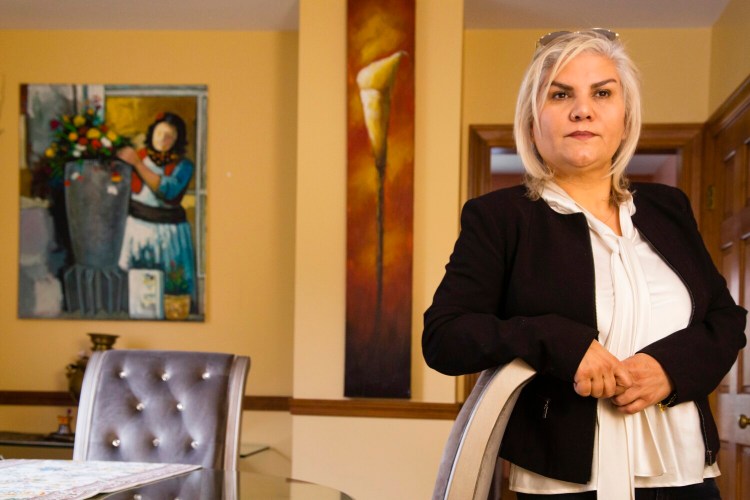The Kurdish population in Maine is small – just over 25 adults and children living mostly in the southern part of the state – but their fear and dismay are immense after the withdrawal of U.S. troops from Syria’s northern border unleashed a Turkish invasion of the Kurdish-held area.
Kurdish Mainers say they appreciate the support of the state’s congressional delegation, whose members last week denounced President Trump’s decision as a reckless, uninformed mistake that will yield drastic moral and strategic consequences, including a potential resurgence of the Islamic State.
Concerns heightened over the weekend after Turkish artillery nearly hit a U.S. military outpost and about 800 ISIS family members escaped after a detention center was shelled. Then on Sunday, the Trump administration announced that the withdrawal will continue, removing 1,000 U.S. troops from the region.
Kurds in Maine are hoping for much different responses from Congress and the Trump administration, namely economic sanctions against Turkey, restored military support to the Kurds and the formation of a no-fly zone over targeted border towns. At least 525 Kurdish “terrorists” have been killed since Turkey began its assault on Wednesday, according to an official Turkish Twitter account.
“This misguided policy has to be stopped,” said Ghomri Rostampour of South Portland, a Kurd who fled Iran as a political refugee in 1998, became a U.S. citizen in 2004 and now owns an international student exchange firm. She’s also a U.S. representative to the Kurdish National Congress, a multinational organization working for an independent Kurdistan.
Rostampour said she has cried with frustration while reading news reports about Kurds being attacked and killed, including men and women who fought alongside American troops.
“We have to hold the president accountable for this,” Rostampour said. “He should not put our allies in danger. These Kurdish people fought for us and died for us. We must be careful how we treat our allies because this is damaging our credibility around the world.”
Opponents of the troop withdrawal say Kurdish soldiers have been the strongest U.S. allies in the fight against the Islamic State, and both Republican and Democratic leaders have questioned who will back American troops in the future if they leave the Kurds unprotected now.
“We were the greatest allies in the region to help defeat ISIS, and now they don’t need us anymore, so they’re abandoning us,” said Omar Aghazadeh of Freeport, a taxi service operator who came to the United States from Iran in 1997 and became a U.S. citizen in 2004.
On Sunday, Trump tweeted that withdrawing U.S. troops was “very smart” in the face of “endless wars.” He has backed the move with $50 million in assistance to Syria “to protect persecuted ethnic and religious minorities” in the region.
Kurds are the largest ethnic group in the world without a state, ranging across a wide swath of the Middle East, from eastern Turkey, through northern Syria and Iraq, and northwestern Iran. In the wake of World War I, Western allies dropped provisions to establish a Kurdish homeland when negotiating the borders of other countries in the region, leaving Kurds to face decades of oppression, persecution and violence.
The Kurdish population is estimated at more than 35 million worldwide, and they make up the majority in Kurdistan, a semiautonomous, ethnically diverse region of 5.9 million people in northern Iraq. More than 15,000 Kurds live in the United States, with larger communities in Nashville, Los Angeles and Washington, D.C., according to various sources.
While Kurds share deep ethnic and cultural ties, the lack of a safe, secure and independent homeland augments their concern for what’s happening to their kinsmen in Syria.
“It’s a very sad time for Kurds everywhere,” Aghazadeh said. “We feel we are one people, no matter where the Kurds are. If it happens to Kurds in Syria today, it could happen to Kurds somewhere else tomorrow. I’m asking President Trump to change his mind and don’t let this disaster happen.”
Turkey’s invasion began Wednesday, after Trump spoke with Turkish President Recep Tayyip Erdogan about the long-threatened incursion into Syria. He then ordered U.S. troops to pull back from the border and make way for the offensive against Kurdish forces.
But Kurds in Maine are certain that Turkey’s goal is much broader, and they fear that many innocent people will be killed.
“There is a potential for significant civilian loss of life,” said Hawreh Haddadi of Windham, who came to the United States as a young boy. He’s written a book, “Finding Kurdistan: A Kurdish Iranian American’s Journey Home,” which is part memoir, part history of his people.
Haddadi and the other Kurdish Mainers say Turkey aims to prevent an uprising of Kurds, who make up about one-quarter of that country’s 80 million people. Persecuted for decades, Kurds in Turkey risk prison and even torture for engaging in political activity, using the Kurdish language in public, displaying Kurdish symbols or even listening to Kurdish music, Rostampour said.
“Turkey has seen Kurds as a threat for many years,” Haddadi said. “Kurds want democracy. Turkey is very determined to stop any Kurdish success. We need serious political support from the U.S.”
Send questions/comments to the editors.



Success. Please wait for the page to reload. If the page does not reload within 5 seconds, please refresh the page.
Enter your email and password to access comments.
Hi, to comment on stories you must . This profile is in addition to your subscription and website login.
Already have a commenting profile? .
Invalid username/password.
Please check your email to confirm and complete your registration.
Only subscribers are eligible to post comments. Please subscribe or login first for digital access. Here’s why.
Use the form below to reset your password. When you've submitted your account email, we will send an email with a reset code.